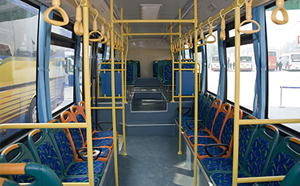Public Transportation
Markets
 Millions of people around the world walk in and out of trains, buses, airplanes and taxis every day.
Millions of people around the world walk in and out of trains, buses, airplanes and taxis every day.
Subway stations, bus depots and airports are swarming with people at all hours. Every time someone coughs or sneezes and then touches something, there is an increased chance for spreading germs.
Transfer of those microbes to a surface such as a bus seat, an airplane tray, a subway strap, a turnstile, or a token vending machine is inevitable and occurs continuously. As such, public transportation can be a very dangerous place – and a perfect catalyst for transmission of germs to outbreak or even epidemic levels.
By using our E Water equipment to kill vast array of pathogens on a daily basis, with an annual application of SD Pro to continually combat bacteria that can cause damage, stains and odors,transportation providers can improve the overall environment in their operations, save costs and reduce toxic chemical use.
"Among the millions of daily travelers are, of course, individuals that (knowingly or unknowingly) are infected with any one of 1,500 microbes that can cause illness."
The possibilities for cross contamination of germs are everywhere one looks. In a USA Today article from November 2012, noted microbiologist Dr. Charles Gerba reported that he often finds strains of influenza virus, E. coli, MRSA and norovirus on airplane tray tables, overhead latches and lavatory doors.
In October 2008, a flight was forced to land midway from its Boston-L.A. route in Chicago, after several passengers suffered uncontrollable vomiting and diarrhea believed to be caused by norovirus contracted inflight. In that case, the cost to decontaminate the plane was exacerbated as it included the removal of upholstery.
Uses
- Subways cars
- train cars
- buses
- taxi cabs
- shuttle buses
- airplanes
- commuter vans
- subway stations
- train stations
- bus depots
- airports and more.
Target Areas
- Turnstiles
- handrails
- straps
- seats
- upholstery
- storage compartments
- trays
- token vending machines
- lavatories, and more.
The SD Labs' Approach:
Transportation managers no longer need to wait until an incident occurs to improve the environment for the travelers they serve. The SD Labs’ approach to these issues in the public transportation realm is to be proactive rather than reactive. In protecting the environment by treating surfaces and common touchpoints with SD Lab coatings, travelers are afforded a new level of comfort previously unavailable. Transportation managers, in the meantime, can mitigate the risk of contamination and any subsequent damage to their company’s reputation, as well as the potential financial impact that it may entail.

